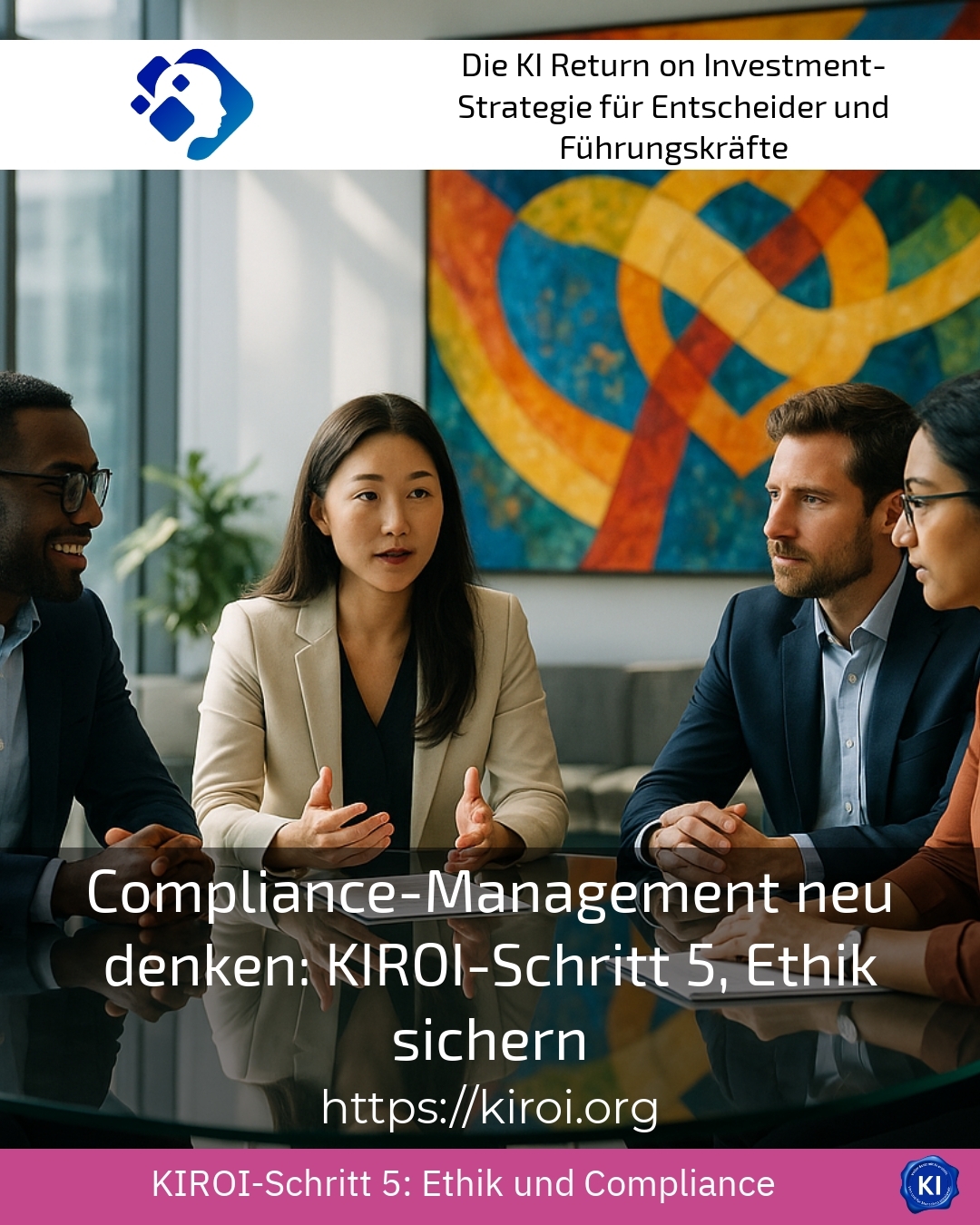In the modern working environment, the topic of Compliance management increasingly important. The fifth step in the KIROI model in particular invites companies to rethink compliance in order to ensure ethics and integrity in the long term. This perspective not only supports companies in complying with applicable regulations, but also strengthens trust and a value-orientated corporate culture in the long term.
Compliance management as a continuous companion
Compliance means much more than the one-off implementation of rules. The fifth step in the KIROI approach shows that compliance management must be a permanent project within the company. Only in this way can ethical standards remain alive and adapt to the dynamic framework conditions.
Companies from the service sector utilise this approach by creating transparent communication channels and regularly training all stakeholders concerned. One example is a group that has taken action against corruption through targeted workshops. Demand and awareness of ethical behaviour increased significantly, leading to a measurable reduction in violations.
In the retail sector, compliance management is used to make supply chains traceable and implement sustainable procurement guidelines. Constant monitoring of suppliers ensures that environmental and social standards are adhered to.
Continuous support through compliance also plays an important role in the healthcare sector. Data protection processes are strengthened through systematic training and the use of modern software. This enables patient data to be managed securely and legal requirements to be met.
Ensuring ethics through sustainable processes
The foundation of compliance management is the development of a culture that supports openness towards misconduct and breaks down contact barriers. Only if employees have confidence that violations will be addressed and that they will not suffer any disadvantages will they be open to necessary reports and clarifying discussions.
A construction company switches its construction site inspections to digital checklists and combines this with regular training. This enables managers to recognise potential safety and regulatory deviations at an early stage and take proactive countermeasures.
A medium-sized IT service provider uses monitoring tools to check sales processes for compliance. If, for example, false product promises are made, the causes - such as incorrect marketing materials - are rectified immediately.
In the financial sector, banks implement regular audits and digital control mechanisms. These create transparency and minimise the risk of money laundering or fraud. In this way, a high level of ethical integrity is achieved.
BEST PRACTICE with one customer (name hidden due to NDA contract) We supported the process of compliance optimisation in production logistics for an international technology group. Using digital tools and intensive management training, compliance with environmental and safety standards was effectively strengthened. This led to a visible increase in employee acceptance and a significant reduction in deviations from regulations.
Practical impulses for compliance management in everyday life
How can compliance management be integrated into day-to-day business? Here are some practical approaches for managers and teams:
- Use simple language in compliance guidelines. This makes the content more accessible for all employees.
- Introduce regular dialogue formats to openly discuss compliance issues and clarify questions.
- Use digital tools for training and documentation to increase traceability and learning success.
In mechanical engineering, a combination of on-site training and e-learning helps to implement technical standards in a binding manner. The integration of all departments creates synergy effects that promote compliance with regulations in a convincing manner.
In the social sector, organisations rely on transparent communication structures and participation. This increases understanding of ethical issues and strengthens team cohesion.
The food industry uses supplier training to ensure quality and safety standards along the entire value chain. Compliance management thus becomes an integral part of product quality.
My analysis
The fifth step in the KIROI model demonstrates that Compliance management should not be seen as a one-off task, but as a dynamic process that anchors ethical behaviour in everyday life. The combination of communication, training and technological support enables companies to build a culture of trust and minimise risks at an early stage.
The sustainable safeguarding of ethics is therefore a success factor in its own right for the company's success. Managers are invited to actively consider compliance in their projects and thus provide impetus for continuous improvement.
Further links from the text above:
Mastering Compliance Guidelines: KIROI Step 5 for Decision-Makers [1]
Implementing compliance guidelines sustainably KIROI [2]
Management Circle seminar programme KIROI and compliance [3]
The 5-Step Compliance Risk Management Process [4]
For more information and if you have any questions, please contact Contact us or read more blog posts on the topic Artificial intelligence here.















